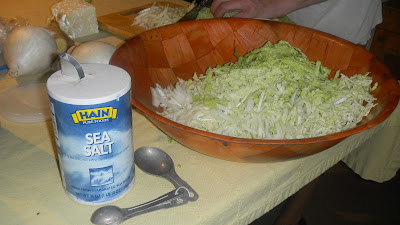"Getting the vegetables submerged is the most critical factor
for success in vegetable fermentation."
Sandor Katz, THE ART OF FERMENTATION
Oh, this is a beautiful book. Bruce loaned me his copy for a quick scan and we decided to try Katz's kraut-chi, a hybrid of German suaerkraut and Korean kimchi. At this most basic level, Katz has a nice way of making you feel that even if you stray from the step-by-step, your fermentation will turn out OK.
"...fermentation is the transformation of food by various bacteria, fungi, and the enzymes they produce."
Chop, salt, pack, wait: that's Katz's shorthand on how to ferment vegetables. So we did. Bag of organic carrots not shown.
CHOP
I used electricity to chop small...
...while Bruce worked a Sabatier to slice.
SALT
Katz recommends 3 tablespoons per 5 pounds of veg, a bit salty for our taste. Next time we'll cut back.
POUND
Not in Katz's quick list, but he recommends it to produce enough juice to submerge the vegetables.
PACK
Bruce's large-mouth funnel makes this step easy.
In the past, we've used the crock method, in which the vegetables and their juices are placed in a bowl or other vessel and weighed down with a plate and brick. I liked the idea of skipping this step, but Katz reminds us that the fermenting process produces considerable CO2, which creates pressure inside the jar. "Jars have been known to explode," says he.
The solution is to release any build-up daily, and while I did this several times on the first day, on Day 2 I wasn't so attentive and when I finally got to it the contents burped and overflowed their jars. ("Why does it smell in here?" Art asked.)
Leaving the lids slightly ajar for a couple days did the trick. And now we wait. How long? Katz suggests tasting after a few days...and then again after two weeks and two months.
Look at what science is discovering about all this:
The traditional view is that a human body is a collection of 10 trillion cells which are themselves the products of 23,000 genes. If the revolutionaries are correct, these numbers radically underestimate the truth. For in the nooks and crannies of every human being, and especially in his or her guts, dwells the microbiome: 100 trillion bacteria of several hundred species bearing 3m non-human genes. The biological Robespierres believe these should count, too; that humans are not single organisms, but superorganisms made up of lots of smaller organisms working together.Yes, you can buy probiotic supplements, but seeding your gut flora with fermented foods is more fun and delicious.









No comments:
Post a Comment